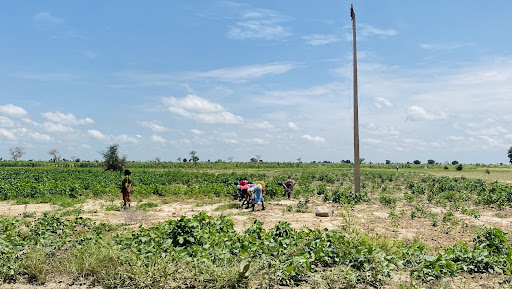Attacks On Farmers Hitting Food Supply In Nigeria’s Borno State
Farmers have told HumAngle that the energy and resources they invested into their fields and crops last year were wasted because of constant attacks by terrorists. The same is happening this year.

Last year, three friends — Mohammad Alkali, Habib Abakar, and Ali Mohammad — raised ₦1.3 million (about $1,700) to venture into farming in Borno State of Nigeria’s North East. They had high expectations, they were told farming was a lucrative business.
It wasn’t until they had invested the money however, that Muhammad and his friends discovered how dangerous farming had become.
The road to their farmland, 40 km from the state capital Maiduguri, only opens from 8am to 2pm as part of the curfew imposed to avoid recurring terror attacks.
In the fields the evidence of fighting and violence was all around them. They would find dangerous items such as bomb shrapnel and bullets while working on the farm field. On one occasion, they found a walkie-talkie radio, which an official with the Civilian Joint Task Force said they had lost during an encounter with Boko Haram terrorists around the area.
Most labourers in the area fear possible terror attacks and are reluctant to work on the farm field. The few courageous ones charge them a higher rate due to the risks attached to the work. “Normally, we go to the farm with 40-45 labourers, but now we only get 20, even at a higher cost per labourer,” Muhammad said.
The violence against farmers in Nigeria’s northeast has continued this farming season, especially in Borno. Another local farmer, Ali Kime, told HumAngle how terrorists warned him and his cohort against working their farms. “Last year we picked your beans, this year we will pick your heads,” he said Boko haram threatened. Ali said they were clearing their farms when the terrorists asked them to vacate the farm or risk brutal death.
‘Constant attacks’
Several farmers have told HumAngle that the energy and resources they invested into farming last year were unyielding due to constant terror attacks. They had prayed for a bountiful harvest this year, but their dreams were shattered when Boko Haram unleashed another series of attacks on them, resulting in loss of life and farm inputs.
“This forced labourers not to go to the farm for fear of being killed or kidnapped,” Muhammad told HumAngle. “And that made us lay low for weeks, hoping the attacks would be subdued.”
When they returned a few weeks later, the farmers saw their crops plundered and their farms pillaged. Boko Haram has since continued the cycle of terror attacks on the farmers. Although farmers said the Borno government had assured them of safety on their farms, they face constant attacks, risking it all to work in their fields.
In June 2023, the Borno State Governor, Babagana Zulum, launched an initiative to support farmers, including providing tractors and subsidised fertilisers. Sadly, farmers who were supposed to be beneficiaries of this initiative are victims of murder and abductions. HumAngle has tracked and reported at least 53 cases of farmers killed or kidnapped in several farm fields in the state from June 2023 to August 2023.
With reports of farmers being slaughtered in their fields, security remains a significant obstacle to the scheme’s success. In Kawuri, a community in the Konduga Local Government, 11 local farmers were kidnapped and asked to pay a ransom of ₦30,000 ($39) each.
The terrorists would later kill both the abductees and the relatives who brought the ransoms.
“A lot of killings have been recorded in many farming communities daily in Borno state,” said Modu Kura, a Civilian Joint Task Force member. “They are attacking the few farming communities that persisted in working their lands and stealing their produce.”
However, the spate of attacks on farmers has exacerbated rates of food insecurity in Borno. Over 2.4 million people in the state face severe food shortages due to the ongoing conflict and displacement, according to the United Nations Food and Agriculture Organization (FAO). The attacks on farmers have worsened the already dire situation, leading to a significant decrease in agricultural output and increasing food insecurity in the region.
The Borno government’s spokesperson, Isa Gusau, did not respond to HumAngle’s calls and messages seeking solutions to the security threats facing farmers in the state.
Summary not available.
Support Our Journalism
There are millions of ordinary people affected by conflict in Africa whose stories are missing in the mainstream media. HumAngle is determined to tell those challenging and under-reported stories, hoping that the people impacted by these conflicts will find the safety and security they deserve.
To ensure that we continue to provide public service coverage, we have a small favour to ask you. We want you to be part of our journalistic endeavour by contributing a token to us.
Your donation will further promote a robust, free, and independent media.
Donate HereStay Closer To The Stories That Matter




